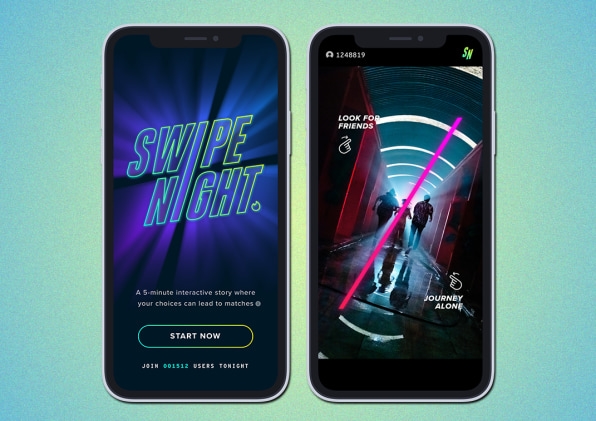Why Tinder really needs you to swipe right on its first original series ‘Swipe Night’
The choose-your-own adventure style of storytelling, once a structure solely for books, has found a new wave of interest in Hollywood. Even before the critical praise of Black Mirror‘s 2018 special Bandersnatch, HBO and director Steven Soderbergh tried something similar with the slow-burn thriller Mosaic. Last April, Netflix dropped an interactive series with adventurist Bear Grylls, You vs. Wild. And 20th Century Fox announced a branching narrative film in the works.
Now the dating app Tinder, for its first foray into original content, is looking to ride the wave with Swipe Night.
Directed by Karena Evans—the filmmaker behind Drake’s viral music videos for “In My Feelings” and “God’s Plan”—Swipe Night is a first-person POV series where the house party you were invited to quickly devolves into apocalyptic mayhem. A meteor is barreling toward Earth, and you have to decide how you’re going to spend the last three hours of your life. Throughout Swipe Night, you have seven seconds to make a series of choices as seemingly small as whether or not to dance, or weightier moral dilemmas such as ratting out a friend for his infidelity. At the end of the experience, you’re matched with a list of people based on your choices.
Swipe Night is an interesting approach to finding new matches, like seeing a movie on a virtual blind date you can chat about afterward. It’s also a clear play into using content to appeal to Tinder’s target demographic: Gen Z (24-year-olds and under). But, more importantly for Tinder, Swipe Night is a way for the dating app giant to shore up some key stats that it needs to remain strong if it’s going to remain the top-grossing app that’s not a game.
Call in the Z team
According to Tinder, half of its users are Gen Z, which prompted the company last year to create the Z Team, a group within Tinder devoted specifically to studying and understanding this generation. Thus far, the Z Team is responsible for such new features as Tinder U, a university-centric version of Tinder; and festival mode, a means to navigate the summer festival circuit.
With Swipe Night, the Z Team focused on creating an experience that was entertaining as well as served the purpose of breaking the ice between users in way that would be meaningful.
“Gen Z is spending a ton of time on entertainment—on YouTube, on Instagram, on Snapchat,” says Ravi Mehta, who had been a product director at Facebook and joined Tinder in June to be its chief product officer. “They’re spending a lot time talking to each other about that entertainment. “That was really the genesis of Swipe Night. How can we create a really interesting, content-centric, interactive entertainment experience that helps you meet each other and helps you come up with really interesting things to talk about?”
To make sure Swipe Night wasn’t some helicopter job of contrived cool, the Z Team tapped Evans to helm the series.
At 23 years old, Evans falls into Tinder’s target demo, and, according to Evans, the company leaned on her to make sure Swipe Night felt right, with authentic dialogue and believable characters.
“It’s not just entertainment. It’s about starting deeper conversations,” Evans says. “I think that what my generation is yearning for, is deeper connections. I’m in search of projects that impact or shift or even curate culture. [Swipe Night] being the first of its kind was so exciting to me. I hope it will be a breakthrough moment for the culture.”
Swipe Night, as online dating expert (and former Tinder sociologist) Jess Carbino sees it, just might be that. “My research indicates that Gen-Zers want to be heard and understood by larger institutions, whether it be their families, workplaces, or the media,” Carbino says. “Tinder is smart to focus on, directly appeal to, and recognize the needs of this population.”
What’s ‘Swipe’ got to do with it? A lot, actually
While users navigate the apocalypse in search of true love, Tinder is surely hoping simultaneously to close the gap in a few important areas. Tinder is by far the crown jewel in parent company Match Group’s carousel of dating apps and sites, which include OkCupid, Plenty of Fish, and Hinge. Tinder boasts a growing user base of 5.2 million average subscribers, according to Match’s Q2 2019 earnings report. Tinder Gold, its $15/month tier that offers more features, accounts for more than 70% of its subscribers, and the app remains one of the most popular in a ballooning market expected to be worth $12 billion by next year.
Despite these positive metrics, Tinder isn’t immune to the fickleness inherent in digital dating.

According to web analytics company SimilarWeb, Tinder’s daily open rate among users fell from 28% to 22.1% when one compares the first eight months of 2018 to this year. In addition, the number of times the app is opened daily also dropped 10.8% year-over-year.
Swipe Night, though, offers an experience with the potential to pull users in with a compelling narrative for relatively long stretches of time. As Mehta pointed out earlier—and what research has consistently shown—is that Gen Z spends the bulk of their time on TikTok, YouTube, Twitch, Reddit, and a handful of other sites. Although Tinder serves a discrete purpose compared with those other platforms, Gen Z’s attention is still split, and Facebook’s entry into dating could augur other social and digital media services to follow suit. Even if they didn’t, who’s to say TikTok or Twitch users aren’t already using those platforms to find likeminded mates?
Because Tinder remains the top dating app for Gen Z, this is the best time for the company to start branching out in ways that push their mission of matching people into different avenues of how to get there, like Swipe Night.
“One of the things Tinder did was, by making the process of meeting each other much more visual and more exploratory, it opened up online dating to an entirely new generation of people. But that was seven years ago,” Mehta says. “Swipe Night was really about where things are going for Gen Z in terms of how they interact with each other across the entire social landscape. Tinder is uniquely positioned to help people meet each other. So how do we draft off of those changes and create something that works really well with Gen Z culture and how they’re using online media today?”
Swipe Night premiers on Tinder October 6 at 6 p.m. local time.
(18)



